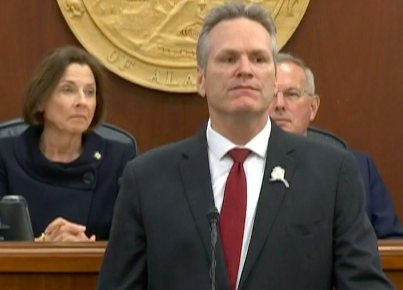Gov. Mike Dunleavy, in his second State of the State speech, touched on some well-traveled themes of crime reduction, the economy, and natural resource development. He emphasized the economy turning around, unemployment at the lowest point in state history, and a renaissance on the North Slope for oil development.
In a speech that galloped through 25 minutes, Dunleavy also spoke about budget challenges and the need for the Legislature and the governor to work together.
“We are given this one moment in time to do what’s best for Alaska. Let’s take advantage of it,” Dunleavy told the House and Senate.
But the governor appeared to be mainly speaking to the people of Alaska directly during most of his time at the podium.
Dunleavy, who had been escorted to the podium by policy opponents Sen. John Coghill and Rep. Gary Knopp, did not offer the House and Senate members present an opportunity to applaud during the meat of his remarks. Although he offered many new ideas to the Legislature and to Alaskans, applause was only granted for the five guests who were introduced, as well as for his wife Rose Dunleavy, and his Cabinet members who were present.
[Read: State of State guest list includes heroes and champions]
Some of his themes of the night:
Letting the people vote: Dunleavy asked the Legislature to allow the people of Alaska to vote on a spending cap, any new taxes, and the structure of the Permanent Fund dividend.
“We must also include the people in these decisions. We must give the people an opportunity to weigh in on items that impact their lives directly,” he said.
“They must be allowed to vote on constitutional amendments, including a spending cap, any proposed PFD changes, and new broad-based taxes. Because just as I said last year, if we are to gain the people’s trust, we must trust the people. It’s the people who placed us here. It’s the people we serve – we work for them,” he said.
He had introduced bills last year that would have moved these questions to the voters, but the Democrat-controlled House and Republican-controlled Senate never allowed the bills to be heard. Tonight, he beseeched them to let the people vote on taxes and a spending cap.
Lottery: Dunleavy will introduce a bill to begin a state lottery. He will create a state inspector general for Alaska to investigate fraud and abuse.
Human Trafficking: Dunleavy will introduce legislation to combat human trafficking.
Land for the people: The governor will offer a bill to put in place initiatives to transfer land to private hands for home sites, agricultural sites, and recreation sites. Alaskans who qualify for a Permanent Fund dividend will have a choice to get a certificate for land, rather than a dividend. A land certificate gives the treasury the benefit of the money, and individuals would get a land certificate at twice the value of the dividend, he said.
Alaska Reads Act: More funds will be directed toward reading initiatives to get students reading at grade level. The Alaska Reads Act has been introduced and appears to have support in the Legislature.
Budget grand discussion: “Last year’s budget was a shock to many Alaskans. But it did demonstrate we can’t continue to spend what we don’t have. Alaskans learned how unsustainable spending levels had become. We recognize this – all of us in this room – together, we supported significant reductions.
“The budget was not crafted with the intent to hurt Alaskans. But pulling back the reins on spending certainly caused many Alaskans discomfort – I recognize that.
“I didn’t run for governor to hurt the state that I love, and the people I care about. No governor wishes to do that. But with that said, we still have a significant fiscal issue that needs to be addressed for the long term,” he said.
Dunleavy said the conversation led to a recognition by Alaskans that the State of Alaska has a fiscal imbalance, and “the state is running out of time.”
He said that the flat budget he introduced this year should allow legislators to focus on a sustainable long-term plan that includes controlling spending, deciding the future of the Permanent Fund and the dividend.
“This initial budget, absent the large reductions introduced last year, should allow us the ability to focus on a sustainable long-term plan. This must include controlling our spending and deciding the future of the permanent fund and the PFD.
House Speaker Bryce Edgmon, in his response to them said he appreciated the tone of the speech but “the devil is in the details.”
The opposition response from the Legislature included Rep. Neal Foster, Rep. Jennifer Johnston, Rep. Louise Stutes, Rep. Steve Thompson and Rep. Chuck Kopp.
Foster said the governor’s budget will require revenue.
Johnston said this isn’t the time for new revenue, but in the governor’s proposal, she saw costs, and is not sure how the governor’s programs will be paid for.
Kopp said he was glad to see the positive outlook and that the governor was going to focus on tribes.
Rep. Steve Thompson said he was hoping the governor would have more about new revenues, and he said he has been working on a state lottery as well.
Rep. Louise Stutes used her time at the microphone to lecture the governor about the need for ferries. Only one of 11 ferries is operational, she said. The cost to repair the current broken-down ferries is in the hundreds of millions of dollars but she didn’t mention how those repairs would be paid.
The governor’s entire speech, as provided to the media:
